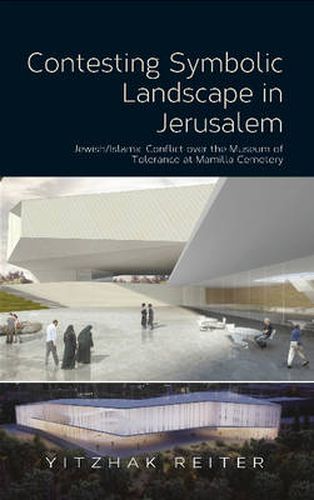Readings Newsletter
Become a Readings Member to make your shopping experience even easier.
Sign in or sign up for free!
You’re not far away from qualifying for FREE standard shipping within Australia
You’ve qualified for FREE standard shipping within Australia
The cart is loading…






In 2006 a dispute broke out regarding an initiative by the Simon Wiesenthal Center in Los Angeles (backed by Israeli authorities) to construct a Museum of Tolerance (MoT) in West Jerusalem. The museum was to be built on a plot of land that in the past had been part of the historic Muslim Mamilla Cemetery, which since the 1980s has served as a municipal parking lot. Debate centred on whether construction of a museum dedicated to human dignity on Muslim cemeterial land was justified. The Northern Islamic Movement and a group of 70 academics and eight Israeli civil society organizations (including rabbis) opposed the project, but their petition to Israel’s High Court of Justice failed. Yitzhak Reiter presents the public and legal dilemmas at the individual level (an act of insensitivity to the Muslim minority in Jerusalem); at the political level (the right of equal treatment by the state and the right to administer holy properties [waqf] according to religious law and rulings of shari'a [Islamic law] courts); and at the universal level (can conflict over a holy place be addressed objectively from the ideological/political positions that the place symbolizes, and is a secular civil court competent/appropriate to adjudicate a religious conflict). Research for this book integrates a multi-disciplinary approach involving history, identity politics, and conflict resolution. Sources include documents obtained from the Shari'a Court of Jerusalem and Israel’s High Court of Justice, as well as Islamic law and Israeli civil law literature, reports of experts submitted to the courts, and personal participation of the author, including discussions with key players and informants. The Mamilla dispute reflects a microcosm of conflicts over religious and national symbols of cultural heritage as well as Jewish majorityArab minority tensions within Israel.
$9.00 standard shipping within Australia
FREE standard shipping within Australia for orders over $100.00
Express & International shipping calculated at checkout
In 2006 a dispute broke out regarding an initiative by the Simon Wiesenthal Center in Los Angeles (backed by Israeli authorities) to construct a Museum of Tolerance (MoT) in West Jerusalem. The museum was to be built on a plot of land that in the past had been part of the historic Muslim Mamilla Cemetery, which since the 1980s has served as a municipal parking lot. Debate centred on whether construction of a museum dedicated to human dignity on Muslim cemeterial land was justified. The Northern Islamic Movement and a group of 70 academics and eight Israeli civil society organizations (including rabbis) opposed the project, but their petition to Israel’s High Court of Justice failed. Yitzhak Reiter presents the public and legal dilemmas at the individual level (an act of insensitivity to the Muslim minority in Jerusalem); at the political level (the right of equal treatment by the state and the right to administer holy properties [waqf] according to religious law and rulings of shari'a [Islamic law] courts); and at the universal level (can conflict over a holy place be addressed objectively from the ideological/political positions that the place symbolizes, and is a secular civil court competent/appropriate to adjudicate a religious conflict). Research for this book integrates a multi-disciplinary approach involving history, identity politics, and conflict resolution. Sources include documents obtained from the Shari'a Court of Jerusalem and Israel’s High Court of Justice, as well as Islamic law and Israeli civil law literature, reports of experts submitted to the courts, and personal participation of the author, including discussions with key players and informants. The Mamilla dispute reflects a microcosm of conflicts over religious and national symbols of cultural heritage as well as Jewish majorityArab minority tensions within Israel.